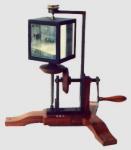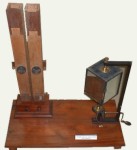 Menu
Menu
|
Function To obtain a persistent sound with a determined frequency. |

| ||
|
|||
|
Description The apparatus is formed by a electromagnet and a tuning fork. Both are parts of the same circuit. When we insert a cell in the circuit and close it, the electromagnet attracts one of the prongs causing the circuit to open. The prong returns to its initial position closing the circuit so that it is attracted again by the electromagnet and so on... | |||
|
Function To show the modes of a vibrant plate. |

| ||
|
|||
|
Description Between the two jaws of a clamp we fix the glass or brass plates to obtain the experiments of the vibrating plates. Once the plate is fixed and spread with fine sand it is made to vibrate with a violin bow so that we obtain interference patterns. | |||
|
Function We can obtain sounds of different frequencies. |

| ||
|
|||
|
Description We have sound pipes of various lengths in which we can have standing waves with wavelengths that correspond to the musical notes. | |||
|
Function Used to enhance nodes and antinodes. |

| ||
|
|||
|
Description In the pipes we have a manometric capsule placed at half of the length of the pipe. In this way the flame signals the fundamental note. | |||
|
Function To observe the vibrant flames. |

| ||
|
|||
|
Description A cube can rotate vertically along one of its axes. The rotation is set by hand with a crank and gear drive. Four mirrors are placed on the vertical sides. The apparatus is used to study the sound through the sound flames. | |||
|
Function Studying the interference of the sound waves. |

| ||
|
|||
|
Description This apparatus is due to König. It is formed by a rotating cubic mirror and by a bellows on which we can engage two of Konig’s sound pipes. | |||